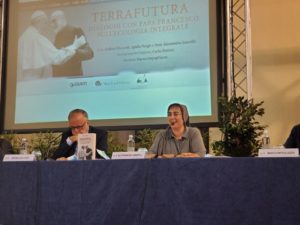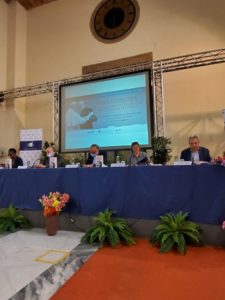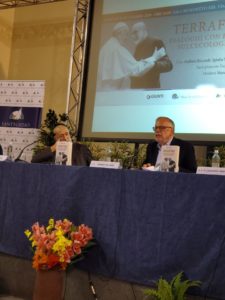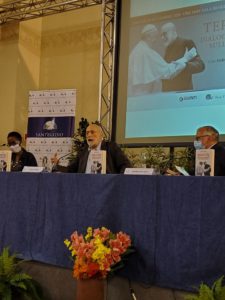We have a duty to not disappoint the young…
We, as Pope Francis requested to our COVID-19 Commission, must prepare the future (not just prepare ourselves for it) and with concreteness…
The worse trauma, worse than the pandemic itself, would be to waste what we have learned … As we will, as the Pontiff says, get out of this crisis either better or worse…
Sr. Alessandra Smerilli, economics expert and advisor to Pope Francis, made this points as she reflected on «Terrafutura. Dialogues with Pope Francis on integral ecology» written by Carlo Petrini. The presentation was held Thursday, Sept. 10, 2020, at 6 pm in the Roman quarter of Trastevere.
Active in the Dicastery for Integral Human Development, with a critical role on its COVID-19 Commission, she was reflecting on this book, or rather appeal to protect the environment, at the Community of Sant’Egidio’s presentation of it.
Sister spoke along with founder of Sant’Egidio, Andrea Riccardi, Italian writer of Somalian origin, Igiaba Scego, and the author. The Community’s President, Marco Impagliazzo, moderated the event.
In her remarks, she noted she was «surprised» at first. «I did not expect the book to be so concrete,» she admitted.
«Carlo Petrini is a person who embodies these concerns of the Pope,» she said.

Explaining how in her role on the COVID-19 Commission, instituted by the Holy Father at the start of the pandemic, she pointed out that he gave them no simple task: «prepare the future,» and «do so concretely.»
«We were not being asked by Pope Francis to prepare for the future, but to prepare the future itself,» she said with a smile.
This work, with simple tone and conversation, she noted, conveys profound insight into these themes.
With her own, insight, she stated: «On the Commission, we try not to speak about restarting or recovery, as though it we are a car we need to get going again, but of instead regeneration.»
The five themes of this book, she underscored, cannot fail to be placed at the center of the regeneration.
«We,» echoing themes through the work, and stated by the Holy Father, there and in this period, «cannot waste this time.»
«What would be worse, would be to waste this time,» she said, reminding: «we exit it either better or worse.»
She also appealed for all responsible adults to remember that they have «a duty to not disappoint the expectations of the young people who warn us that there is still time for change. There is a need for an alliance between young people and adults.»
On the aspect of community, Marco Impagliazzo said, «the community is a salvation, for people, for everyone, as Pope Francis reminded us during his March 27th Extraordinary Urbi et Orbi in an empty St. Peter’s Square, that we are all on the same boat.»
«He reminds us that we must stay together, and this, applies today, in all senses, and including with the environment and climate change.»
«It is a book that makes you think,» said Andrea Riccardi, applauding that Pope Francis really opened up and felt comfortable speaking to Petrini.
The Community’s founder also asked: «Is it possible to to multiply this strategy of alliances?» «I believe it is,» he stressed, encouraging cooperation, namely that which the Pontiff calls for in these dialogues, to work toward the common good.
«I come from the mindset that one must have the attitude, that nothing is lost, and that everything can change,» said Riccardi.
«An entertaining book,» is how Somalian-born Italian writer, Igiaba Scego, described the work, while noting how she, also being Muslim, really appreciated the work’s call to never «ignore the substance of individuals,» and to «never discard them.»
Admitting the «mutual sympathy» immediately between him and Pope Francis, and his shock when he initially received a call with the other end of the receiver stating, «Hello, I am Pope Francis,» said Carlo Petrini recalling their time together.
However, he clarified, that as «two very different and distinct people,» what unites them: «their nonne (grandmothers), both from Piedmont, Italy.
The book, divided into five sections: biodiversity, economy, migration, education and community, was motivated by the author’s desire to highlight and promote the Holy Father’s teachings on the environment, and combat damage to our planet, as Pope Francis underscored his 2015 encyclical on the environment, Laudato Si.
 Carlo Petrini is founder of the global “Slow Food” movement, established in the 1980s «to safeguard regional traditions in the face of a spiralling “fast food” consumeristic cultural and economic trend.» According to Vatican News, it has since evolved to embrace a comprehensive approach to food and lifestyle that recognizes the strong connection between behavior, food production and consumption, economics and the planet.
Carlo Petrini is founder of the global “Slow Food” movement, established in the 1980s «to safeguard regional traditions in the face of a spiralling “fast food” consumeristic cultural and economic trend.» According to Vatican News, it has since evolved to embrace a comprehensive approach to food and lifestyle that recognizes the strong connection between behavior, food production and consumption, economics and the planet.



